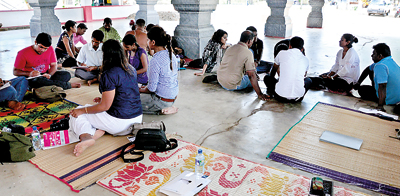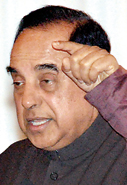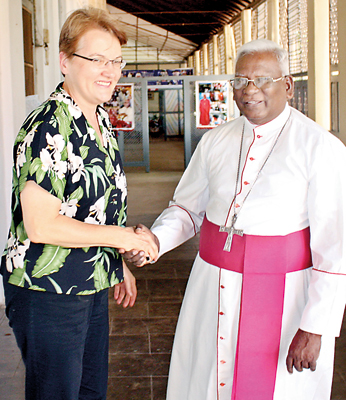Let’s talk about change
The Sri Lankan Diaspora is in the spotlight now more than ever, particularly connected with the contentious international political debate after the war’s end. While Sri Lanka is trying to move forward in the aftermath, Voices for Reconciliation (VFR), a group of young British-Sri Lankans, has taken up the important, but challenging task of promoting productive dialogue within the Sri Lankan Diaspora in the U.K. Eight members of VFR were in Sri Lanka last month, on a visit sponsored by International Alert and the British High Commission. They attended the annual conference of Sri Lanka Unites in Jaffna and also travelled to Hambantota and Kandy.

Members of VFR at a discussion with an inter-faith group during their recent visit to Sri Lanka
The members of VFR first met on a visit to Sri Lanka in 2011 organised by International Alert and the Royal Commonwealth Society. Travelling around the country they met a host of Sri Lankans including those at the grassroots community level, which VFR member Indunil said “opened up our eyes to the situation in Sri Lanka.”
“I think from my experience within the Diaspora, the conversation centres around the political issues, and that’s been at the forefront of the discussion rather than what I’ve seen in Sri Lanka where the conversation is more based on everyday issues like unemployment, education, opportunity for youth and gender-based violence,” said VFR member, Rohan. “In the Diaspora those are not talked of as much.”
It’s very hard to generalise the Diaspora in its complexity, says Indunil, as perceptions of different Sinhala, Tamil and Muslim communities are shaped under the circumstances in which they left the country, whether economic or otherwise, how much they have kept in touch with their Sri Lankan roots, where they live in the U.K. and sometimes by the very fact that they left the country. Back in the U.K., the discussions about Sri Lanka can get quite intense and emotional.
“The tension takes different forms, so we can’t speak as representatives of the whole Diaspora community, but we’ve heard that in some universities where there used to be a Sri Lankan society there would be a division and a Tamil society would be created in opposition to the Sri Lankan society, or in some cases the Sri Lankan society will be closed down and just the Tamil society will remain,” Indunil said. “That’s some indication of the intensity of feeling.”
That’s exactly why VFR is trying to encourage interaction between the different Diaspora ethnicities.
“On our 2011 visit, we realised that as a diverse group of people of different ethnicities, we could talk about Sri Lanka in a respectable way which we hadn’t experienced before,” Indunil said. “We wanted to take that experience and make the most of it when we went back to the U.K. and expose others to take that approach to discuss Sri Lanka and engage with it more deeply.”
Of the eight members of VFR, Indunil, a Cambridge-graduate and an editor for a London publishing house, and Rohan, a third generation Sri Lankan Catholic who wrote his undergraduate thesis on post-colonialist nationalism in Sri Lanka and his graduate thesis on the role of Diasporas in changing global perceptions of ethno-nationalist movements spoke to the Sunday Times last week. Other members include an architect, a child abuse advocate, a physiotherapist and a quantitative risk consultant.
Indunil called VFR a “link that facilitates networks within the Diaspora communities and with Sri Lanka.” At the moment, there is no dialogue within Diaspora groups; it’s more of a debate, so VFR organizes series of dialogue workshops with congregations of Sri Lankans in the U.K., especially university groups.
“Within university societies is where we work on a social level,” Rohan said. “I think Sri Lankans of all ethnicities will always interact on a cultural level. However, if it goes deeper, if you start talking about Sri Lanka, they are not going to talk. The point of all this discussion is to create a safe space for that dialogue to occur.”
Getting the British-Sri Lankans together for a workshop is not without its challenges. Once, VFR had talks for a year with a university group just to get them to participate in a workshop.
Indunil described one of the more successful outcomes. “One time, there were two participants who were very skeptical at first, but after a series of workshops and being exposed to wide range of perspectives they haven’t heard before, they actually came to Sri Lanka and participated in the Sri Lanka United Future Leaders conference, which is a fantastic example of how discussion can lead to future engagement and action in Sri Lanka.”
The Diaspora communities don’t always trust what VFR is trying to do and even the idea of constructive dialogue is an “unknown entity”, says Rohan. When organizing workshops, VFR has to consider the stakes for all parties involved.
“Due to the nature of our work, I think it’s crucial to remain apolitical,” Rohan said. “If we take a political stance, then we immediately alienate a section of the community and we can’t do that.”
VFR members insist on remaining unassociated with any organizations, even going as far as to request excluding their full names from the newspaper.
“When we come over here people see us without bias, because we are not associated with any organizations, people talk to us and freely and we don’t want to lose that,” the members said.
“The Sri Lankan Diaspora in the U.K. is incredibly diverse, incredibly talented, highly skilled and there’s so much they can contribute to Sri Lanka and sometimes that potential is going to waste,” Indunil added. “It’s not productive the way the interactions within the Diaspora are currently held. We are just trying to get young people in particular to engage in the issues so they can contribute more positively in the future.”
Follow @timesonlinelk
comments powered by Disqus


























